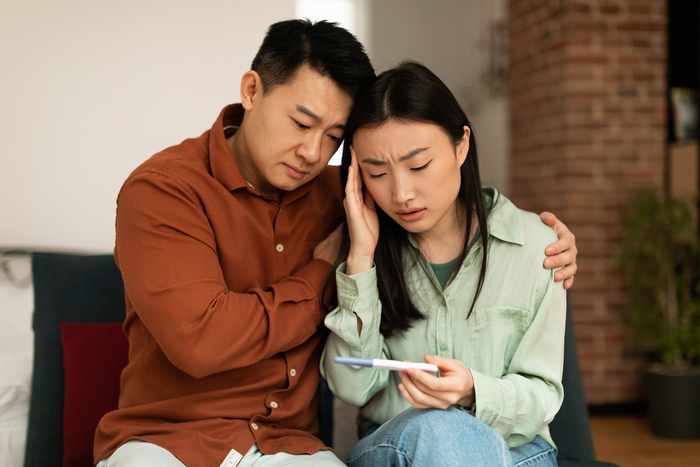Embarking on the journey to parenthood is a profound experience filled with hopes and dreams. However, amidst the joy, some individuals face the heartbreaking reality of miscarriage – an experience more common than often acknowledged, affecting approximately 10-20% of known pregnancies.[1]
Miscarriage presents itself in various forms, each with its unique challenges from threatened to missed miscarriages, the spectrum is broad and often mystifying.[2]
- Threatened miscarriage occurs when the body signals the possibility of a miscarriage. Light vaginal bleeding or lower abdominal pain may persist for days or weeks, while the cervix remains closed. The situation may resolve, leading to a healthy pregnancy, or unfortunately progress into a miscarriage.
- Inevitable miscarriage can follow a threatened miscarriage or transpire without warning. It involves more pronounced vaginal bleeding and intensified lower abdominal cramps. During the miscarriage, the cervix opens, and the developing foetus is expelled amidst the bleeding.
- Complete miscarriage takes place when all pregnancy tissue is naturally expelled from the body without requiring medical intervention. Vaginal bleeding and cramping, akin to labour or intense period pain, signify the uterus contracting to empty.
- Incomplete miscarriage happens when only some of the pregnancy tissue remains in the uterus and medical intervention might be needed to remove it. Vaginal bleeding and lower abdominal cramping may continue as the uterus continues trying to empty itself.
- Missed or silent miscarriage occurs when the baby may have ceased development or passed away, yet the body hasn’t recognized it. Typically diagnosed during a routine ultrasound scan with the gynaecologist, usually around the 12th or 20th week “anomaly” scan. If you have a missed miscarriage, you may have a brownish discharge. Some of the pregnancy symptoms, such as nausea and tiredness, may have faded. You might have noticed nothing unusual.
TCM views the Kidney Essence (Jing), Yin, Yang, and Qi as vital contributors to the reproductive system’s health and overall balance.[3] The Kidney Essence is considered the foundation of reproductive vitality, providing the raw material for conception and embryonic development. Yin and Yang represent the complementary forces maintaining harmony in the body, while Qi is the vital energy sustaining life processes. Imbalances in these elements, such as a deficiency in Kidney Essence, disruptions in Yin or Yang, or irregularities in Qi flow, are seen as potential contributors to the risk of miscarriage in TCM philosophy. TCM practitioners employ methods like pulse diagnosis and tongue examination to assess the flow of Qi and the balance of Yin and Yang within the body.
Self-care after a miscarriage
Navigating self-care after a miscarriage is a delicate but vital aspect of the healing process. TCM provides a holistic approach to recovery. It advocates a personalised approach, focusing on restoring balance to Qi, Yin, and Yang, integral to reproductive health.
TCM also places a profound emphasis on the mind-body connection, acknowledging the intricate interplay between emotions and physical health. TCM believes that emotional well-being is integral to overall health, and imbalances in emotions can affect the Qi, the body’s vital energy and vice versa. A harmonious mind-body connection is fundamental to overall health. In TCM, a mini-confinement refers to a postpartum recovery period that involves specific practices aimed at promoting healing, restoring balance, and supporting overall well-being after childbirth or, in some cases, after a miscarriage. The duration of a TCM mini-confinement typically lasts around 14 days. During this period, individuals, especially new mothers, follow a set of guidelines and practices that vary based on TCM principles. These may include dietary recommendations, specific rest and sleep patterns, and limited physical activities. The goal is to allow the body to recover, replenish energy, and prevent the potential development of health issues in the future.
Thus, a mini-confinement is essential for recovery as this intentional period set aside for self-care facilitates physical recovery, nurtures emotional well-being, and aids in restoring balance and addressing potential hormonal imbalances.
TCM practices such as acupuncture and herbal remedies, are designed to restore balance and regulate emotions. During a consultation for mini-confinement, TCM practitioners will assess individual constitutions and symptoms, employing techniques like pulse diagnosis and tongue examination, and then personalise the treatments individually to address specific imbalances, promoting overall well-being.
i. Acupuncture
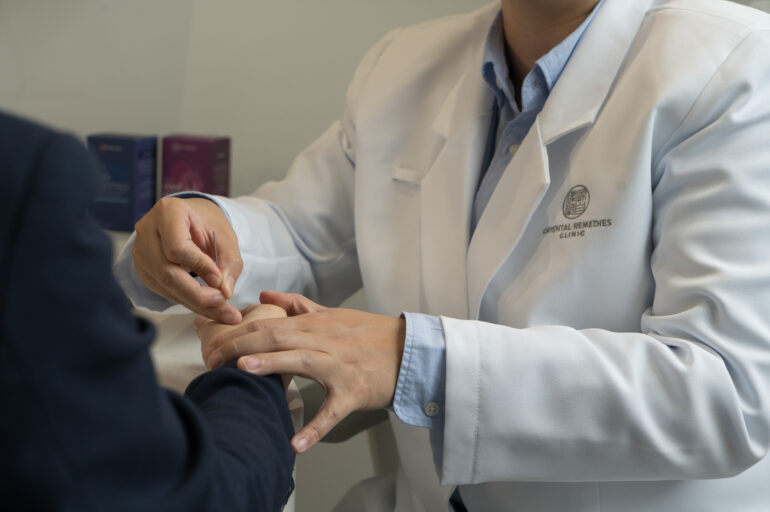
Acupuncture, involving the insertion of thin needles into specific points, aims to stimulate the body’s energy flow, promoting balance and alleviating symptoms such as emotional distress and physical discomfort. Common acupoints used are Hegu 合谷 (LI4), Tai Chong 太冲 (LR3), Guan Yuan 关元 (CV4), San Yin Jiao 三阴交 (SP6) and more.
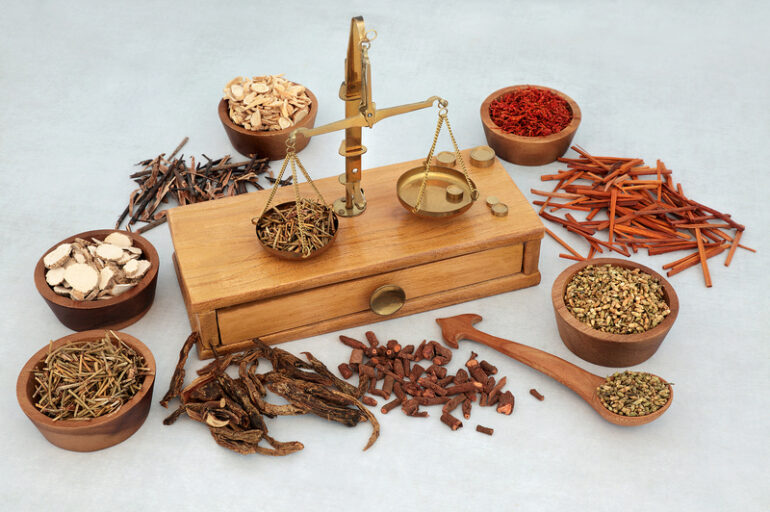
The herbal remedies, meticulously selected based on individual body constitutions and symptoms, complement acupuncture by nourishing the body’s Qi and Blood. These natural supplements support the body’s inherent healing processes, aiding in the restoration of energy and vitality. Herbs or herbal formulas such as Si Wu Tang (四物汤), Zuo Gui Wan (左归丸), Tu Si Zi (菟丝子) and Xu Duan (续断)[4] are commonly prescribed.
Integrating technology-enhanced therapies such as Cell Pro Therapy and Electro -Lymphatic Therapy (ELT) into TCM further enhances physical recovery and emotional well-being.
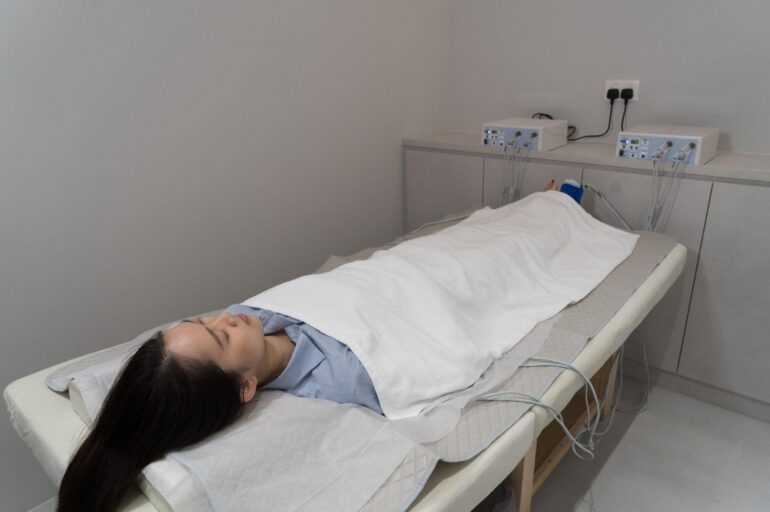
Negative ions, abundant in natural environments like forests and waterfalls, are thought to positively affect overall wellness. Cell Pro Therapy (CPT) emits a large amount of negatively charged ions, also known as reducing electrons into the body. These reducing electrons act as an antioxidant and may promote recovery and overall wellness. Therefore, we can use Cell Pro Therapy to support the body’s recovery after a miscarriage. It may help to:
- Improve blood circulation by enhancing the production of nitric oxide, a molecule that helps dilate blood vessels, leading to increased blood flow and oxygen delivery to tissues which aid in recovery.[5]
- Improve sleep by balancing the serotonin and melatonin levels in the body. Negative ions contribute to overall well-being by enhancing oxygen flow and promoting a sense of calm and relaxation. It also balances the levels of serotonin and melatonin in the body. Serotonin is a neurotransmitter, which converts to melatonin, the hormone that helps to regulate our sleep-wake cycle, promoting better sleep quality.[6]
- Create a more favourable environment for reproductive health through the reduction of oxidative stress by acting as an antioxidant which neutralises the harmful free radicals.[7]
ii. Electro-Lymphatic Therapy (ELT)
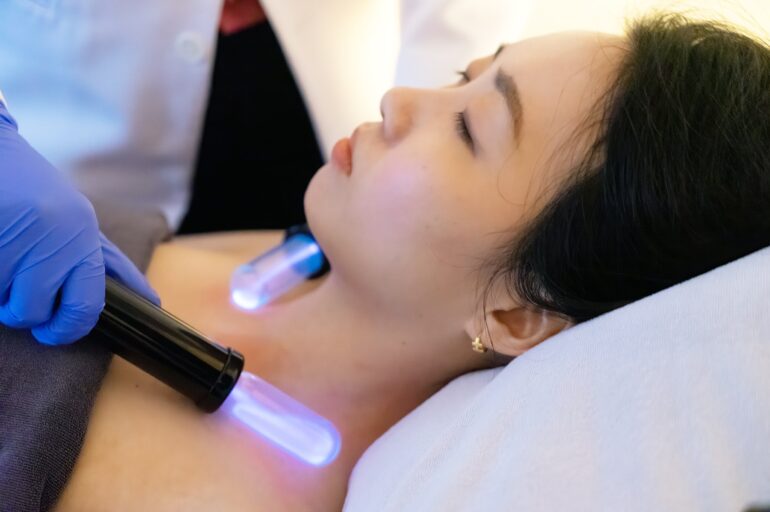
ELT is an FDA-registered, non-invasive technology that helps to stimulate proper flow and drainage of the lymphatic system. With improved lymphatic flow, it may contribute to enhanced blood circulation, promoting tissue healing and recovery after a miscarriage. In addition, ELT also facilitates lymphatic drainage which potentially assists in regulating female hormone levels (oestrogen and progesterone), creating a more balanced hormonal environment.[8]
During the mini-confinement period, adopting a supportive lifestyle complements TCM treatments and tech-enhanced therapies, contributing to holistic recovery. Here are some good habits to adopt during the recovery period:
- Adequate rest and limit strenuous exercise: Prioritise sufficient sleep at night and short naps during the day to support the body’s rejuvenation and recovery.
- Mindful eating: Choose warm, nourishing foods such as ginger and old vinegar (in moderation) to replenish Qi and Blood. Avoid cold or raw foods and opt for well-balanced cooked meals.
- Maintain warmth: Keep the body warm to prevent Qi stagnation. Dress in layers and use warm blankets, especially in cold weather or environment.
- Gentle exercise: Engage in light exercises such as walking or Tai Chi to promote the flow of Qi and maintain physical well-being without overexertion.
- Hydration: Stay well-hydrated with warm liquids and herbal teas, supporting the body’s natural detoxification processes.
- Emotional well-being: Practice stress-reducing activities such as meditation, deep breathing, or gentle yoga to promote emotional balance and harmony.
- Social support: Seek the company of supportive family members and friends. Emotional well-being is an integral part of the recovery process.
These lifestyle recommendations, coupled with TCM treatments and tech-enhanced therapies, form a holistic approach to post-miscarriage recovery. They create a balanced and nurturing environment for overall well-being. For personalised guidance tailored to your specific health needs, always consult with qualified TCM practitioners.
How TCM can help in preparing you for your next pregnancy
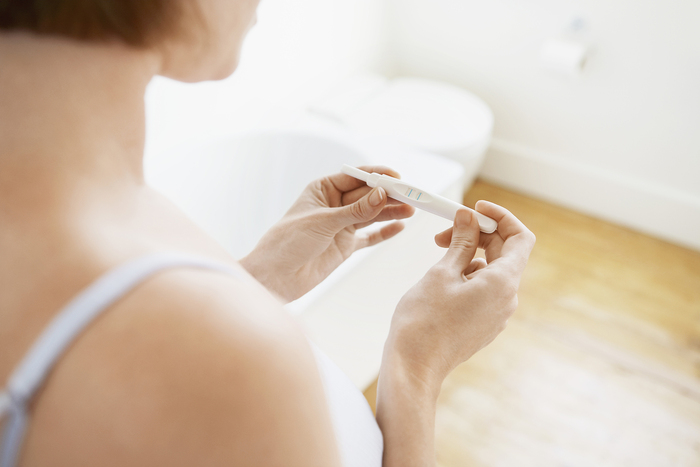
Following a miscarriage, the journey toward a healthier pregnancy can benefit from the holistic advantages of TCM. TCM can play a pivotal role in optimising fertility and addressing concerns about future pregnancies:
1. Regulating the menstrual cycle
TCM views the regulation of menstrual cycles as a fundamental aspect of promoting fertility. It emphasises restoring balance in the body’s energy, particularly focusing on the vital substances Qi and Blood.
2. Balancing hormone levels
The balance of Yin and Yang, representing the feminine and masculine aspects of energy, is essential in TCM. Hormonal imbalances often stem from disruptions in this delicate equilibrium which is why TCM treatments aim to restore Yin-Yang balance to create a supportive environment for fertility.
Acupuncture and herbal medicines are utilised to balance Yin, Yang, Qi, Blood and hormone levels, promoting healthy predictable menstrual cycles which enhance reproductive health.
Studies suggest that acupuncture may regulate menstrual cycles by influencing the endocrine system and improving blood flow to the reproductive organs. Acupuncture points related to reproductive health are stimulated to balance hormones and promote regular menstruation.[9,10]
TCM often utilises herbal formulations to regulate menstrual cycles. Specific herbs are chosen based on an individual’s diagnosis, aiming to address underlying imbalances that may contribute to irregularities in the menstrual cycle.[11]
In conjunction with TCM treatments, lifestyle advice becomes important. Recommendations include maintaining a balanced diet, incorporating specific foods beneficial for fertility, practising stress-reducing techniques, and engaging in gentle exercises to support overall well-being.

Also read Top 30 Foods You Should Eat To Boost Your Fertility
Each individual’s fertility journey is unique, and collaborating with TCM practitioners ensures a personalised approach. TCM practitioners conduct thorough assessments considering body constitution, menstrual history, and overall health. With this information, a tailored treatment plan, including acupuncture sessions, herbal remedies, and lifestyle advice, can be developed to address specific needs and optimise fertility.
Your healing is the most important!
In the aftermath of a miscarriage, embarking on a journey of healing and recovery requires a comprehensive approach that extends beyond just physical recuperation. TCM stands as a beacon of holistic well-being, addressing not only the physical aspects but also nurturing the emotional and spiritual dimensions of the self.
Experiencing a miscarriage is a journey laden with emotional and physical complexities. In this delicate time, seeking support and proper care is not just advisable, it’s vital. Reach out to healthcare professionals, support groups, or friends and family who can provide understanding and compassion. Remember, you’re not alone in this journey, and taking the time to prioritise both your emotional and physical health is an act of self-compassion. Seeking support is not a sign of vulnerability but a testament to strength and resilience during this sensitive period.
At Oriental Remedies Group, most of our physicians are trained in both Biomedical Science and TCM at Nanyang Technological University (Singapore) and China for a minimum of 5-8 years before being certified to practise in Singapore. If you or your loved one is looking for a holistic way to care for yourself during this period, consult our physicians at +65 8087 0486 for a targeted treatment plan.
—
This article is written by Physician Eileen Lim (Oriental Remedies Group, Singapore), a registered TCM physician certified by the Traditional Chinese Medicine Practitioners Board (TCMPB).
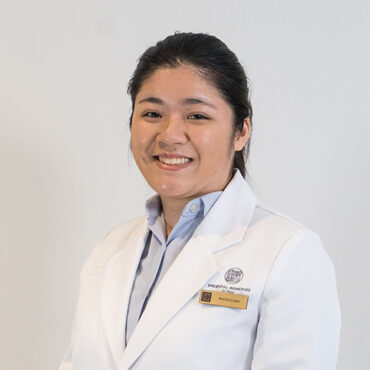
Disclaimer:
The content on this page is for information and educational purposes only. Such medical information may relate to disease, injury, drugs and other treatments, medical devices and/or health products. Medical information does not amount to advice, and if advice is needed an appropriate professional help should be sought. The disclaimer asserts that no warranties or representations are given in respect of the medical information, and that the website operator should not be held liable if a user suffers any injury or loss after relying upon the medical information.
Any devices used for technology-enhanced therapies are intended for use only for general well-being purposes or to encourage or maintain a healthy lifestyle, and is not intended to be used for any medical purpose (such as the detection. diagnosis, monitoring, management or treatment of any medical condition or disease). Any health-related information provided by this device or software should not be treated as medical advice.
References:
[1] Yu, L. M. (2023, September 7). Miscarriages: More common than you think. Gleneagles Hospital Singapore. https://www.gleneagles.com.sg/health-plus/article/facts-about-miscarriages
[2] Australian Government Development of Health and Aged Care. (2023, July 17). Miscarriage. Pregnancy, Birth and Baby.
https://www.pregnancybirthbaby.org.au/miscarriage#:~:text=in%20pregnancy%20loss.-,What%20are%20the%20types%20of%20miscarriage%3F,pregnancy%20and%20a%20blighted%20ovum.
[3] Lewis, R. (2008). The infertility cure: The ancient Chinese wellness program for getting pregnant and having healthy babies. Hachette UK.
[4] Hullender Rubin, L., Cantor, D., & Marx, B. L. (2013). Recurrent Pregnancy Loss and Traditional Chinese Medicine. Medical acupuncture, 25(3), 232–237. https://doi.org/10.1089/acu.2012.0911
[5] Premont, R. T., Reynolds, J. D., Zhang, R., & Stamler, J. S. (2020). Role of Nitric Oxide Carried by Hemoglobin in Cardiovascular Physiology: Developments on a Three-Gas Respiratory Cycle. Circulation research, 126(1), 129–158. https://doi.org/10.1161/CIRCRESAHA.119.315626
[6] Mann, D. (2002, May 6). Negative ions create positive vibes. Negative Ions Create Positive Vibes. https://www.webmd.com/balance/features/negative-ions-create-positive-vibes
[7] AccqSleepLabs. (2022, May 17). Why salt air makes you sleepy – the power of negative ions for sleep. Ocean Air & Sleep: Why Salt Air Makes You Sleepy. https://www.accqsleeplabs.com/blog/ocean-air-amp-sleep-why-salt-air-makes-you-sleepy#:~:text=These%20negative%20ions%20not%20only,us%20fall%20asleep%20at%20night.
[8] Morfoisse, F., Zamora, A., Marchaud, E., Nougue, M., Diallo, L. H., David, F., Roussel, E., Lacazette, E., Prats, A. C., Tatin, F., & Garmy-Susini, B. (2021). Sex Hormones in Lymphedema. Cancers, 13(3), 530. https://doi.org/10.3390/cancers13030530
[9] Quan, K., Yu, C., Wen, X., Lin, Q., Wang, N., & Ma, H. (2022). Acupuncture as Treatment for Female Infertility: A Systematic Review and Meta-Analysis of Randomized Controlled Trials. Evidence-based complementary and alternative medicine : eCAM, 2022, 3595033. https://doi.org/10.1155/2022/3595033
[10] Zhu, J., Arsovska, B., & Kozovska, K. (2018). Acupuncture Treatment for Fertility. Open access Macedonian journal of medical sciences, 6(9), 1685–1687. https://doi.org/10.3889/oamjms.2018.379
[11] Hung, Y. C., Kao, C. W., Lin, C. C., Liao, Y. N., Wu, B. Y., Hung, I. L., & Hu, W. L. (2016). Chinese Herbal Products for Female Infertility in Taiwan: A Population-Based Cohort Study. Medicine, 95(11), e3075. https://doi.org/10.1097/MD.0000000000003075

